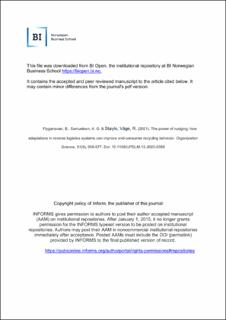| dc.contributor.author | Flygansvær, Bente Merete | |
| dc.contributor.author | Samuelsen, Asta Gjetø | |
| dc.contributor.author | Støyle, Rebecka Våge | |
| dc.date.accessioned | 2022-04-25T12:37:37Z | |
| dc.date.available | 2022-04-25T12:37:37Z | |
| dc.date.created | 2021-09-17T10:37:55Z | |
| dc.date.issued | 2021 | |
| dc.identifier.citation | International Journal of Physical Distribution & Logistics Management. 2021, 51 (9), (958-977) | en_US |
| dc.identifier.issn | 0960-0035 | |
| dc.identifier.uri | https://hdl.handle.net/11250/2992585 | |
| dc.description.abstract | Purpose Research shows a recycling behavior gap where end consumers are positive towards recycling but do not act in accordance with their intentions. Such a gap creates challenges for reverse logistics systems. The purpose of this paper is to investigate how adaptations in reverse logistics systems towards end consumers-turned-suppliers can improve recycling behavior. Design/methodology/approach A framework with three propositions is developed and evaluated empirically using a two-group dependent post-test quasi-experimental design. The empirical setting is recycling of household waste. Three interventions are evaluated as: (1) the social norms nudge, (2) the distance nudge and (3) the availability nudge. Findings The results show that nudging improved recycling action behavior for the experimental group. Control group behavior remained constant. Research limitations/implications This paper suggests that the end-consumer’s role as suppliers needs to be included more actively into reverse logistics systems for products to enter the preferred loops of recycling in the circular economy. Originality/value A new field of climate psychology is used to explain challenges in reverse logistics systems and nudging is demonstrated as a tool with which to deal with them. The study also shows how quasi-experiments can be applied in logistics research. | en_US |
| dc.language.iso | eng | en_US |
| dc.publisher | Informs | en_US |
| dc.rights | Navngivelse-Ikkekommersiell 4.0 Internasjonal | * |
| dc.rights.uri | http://creativecommons.org/licenses/by-nc/4.0/deed.no | * |
| dc.subject | Reverse logistics systems | en_US |
| dc.subject | Recycling behavior | en_US |
| dc.subject | Nudging | en_US |
| dc.subject | Household waste | en_US |
| dc.subject | End-consumer | en_US |
| dc.subject | Circular economy | en_US |
| dc.subject | Experiment | en_US |
| dc.title | The power of nudging: how adaptations in reverse logistics systems can improve end-consumer recycling behavior | en_US |
| dc.title.alternative | The power of nudging: how adaptations in reverse logistics systems can improve end-consumer recycling behavior | en_US |
| dc.type | Peer reviewed | en_US |
| dc.type | Journal article | en_US |
| dc.description.version | acceptedVersion | en_US |
| dc.source.pagenumber | 20 | en_US |
| dc.source.volume | 51 | en_US |
| dc.source.journal | International Journal of Physical Distribution & Logistics Management | en_US |
| dc.source.issue | 9 | en_US |
| dc.identifier.doi | 10.1108/IJPDLM-12-2020-0389 | |
| dc.identifier.cristin | 1935271 | |
| cristin.ispublished | true | |
| cristin.fulltext | postprint | |
| cristin.qualitycode | 1 | |

